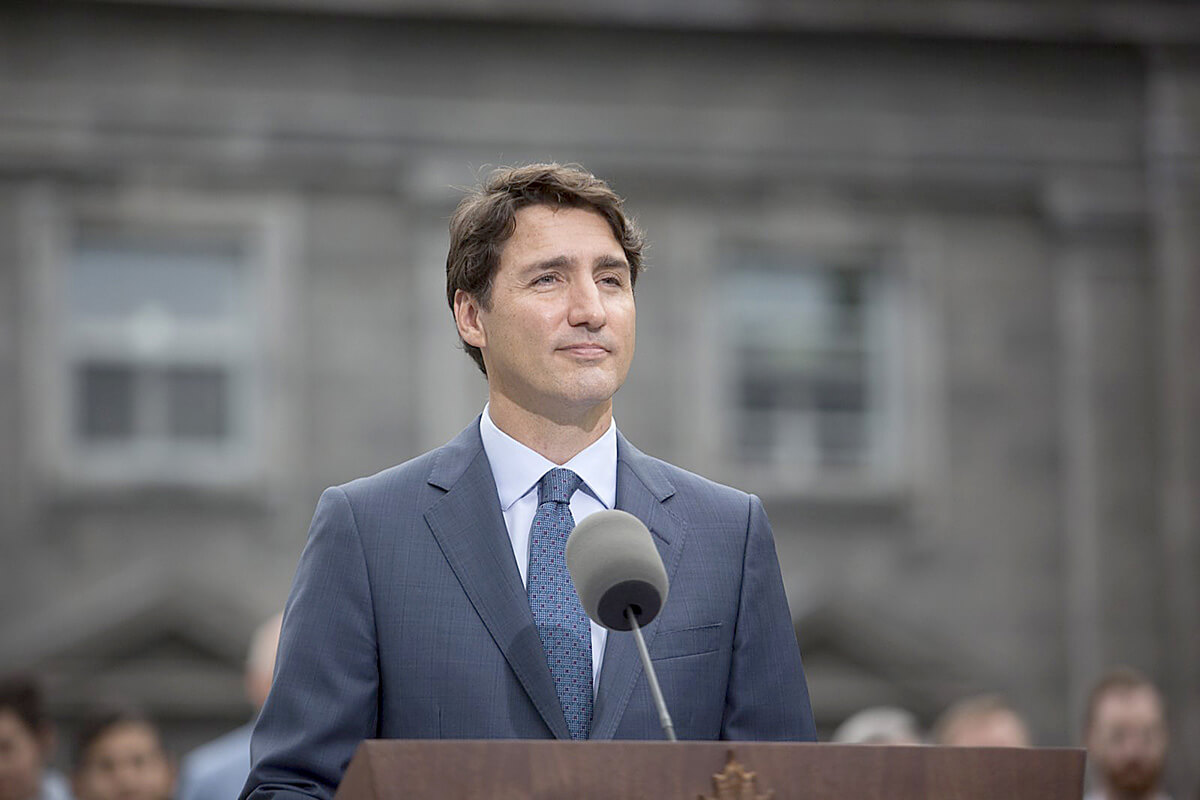‘There may be more we need to do,’ Trudeau says as omicron variant spreads

Prime Minister Justin Trudeau said today that Canada is considering new measures to slow the spread of the omicron coronavirus variant — a strain that may be more infectious than previous versions of the virus.
Speaking briefly to reporters before meeting with his cabinet on Parliament Hill, Trudeau said the government is watching omicron “very, very closely.”
“We know that even though Canada has very strong border measures now — we need vaccinations to come to Canada, we need pre-departure tests, we need testing on arrival — there may be more we need to do and we’ll be looking at it very carefully,” Trudeau said.
It wasn’t immediately clear if Trudeau was suggesting that COVID-19 arrival tests would become the new norm for returning travellers. Under the current travel regime, inbound travellers need to show proof of a negative molecular COVID-19 test taken before arrival in Canada — but only a small number of travellers are randomly selected for take-home tests.
Some provincial premiers — such as Ontario’s Doug Ford — have been urging Ottawa to introduce point-of-arrival testing for all passengers arriving in Canada, regardless of where they’re coming from.
Starting today, Canada has dropped the pre-departure molecular testing requirement for Canadian citizens and permanent residents who take short trips across the Canada-U.S. border. If an eligible traveller is gone from Canada for less than 72 hours, a test is not required to re-enter Canada from the U.S. It is unclear if that more permissive approach will continue now that omicron is in circulation.
Despite pressure from some business and tourism groups, Canada has so far kept the pre-departure molecular testing requirement in place for all other travellers.
Asked if more restrictions would be coming today, Health Minister Jean-Yves Duclos told reporters he can’t say more until he’s had a chance to meet with his cabinet colleagues.
“We are going to talk to you about everything afterwards,” Duclos said.
Large number of mutations
The omicron variant is notable because it has a large number of mutations, which may affect its transmissibility and the effect of COVID-19 vaccines.
In an interview with the U.K.-based Financial Times, Moderna CEO Stéphane Bancel predicted existing vaccines will be much less effective at tackling omicron.
“There is no world, I think, where [the effectiveness] is the same level … we had with [the] delta [variant],” Bancel said.
“I think it’s going to be a material drop. I just don’t know how much because we need to wait for the data. But all the scientists I’ve talked to … are like, ‘This is not going to be good.'”
While Moderna’s leader is signalling concern about the effectiveness of vaccines against the omicron variant, the co-founder of BioNTech — the company that co-developed the Comirnaty vaccine with Pfizer — said today that while the new variant could lead to more infections, it’s likely that fully vaccinated people will still be protected from severe illness.
“Our message is, ‘Don’t freak out, the plan remains the same. Speed up the administration of a third booster shot,'” Ugur Sahin told the Wall Street Journal.
Vaccines teach the immune system — which includes both antibodies and T-cells — to recognize part of a virus. Antibodies prevent people from becoming infected in the first place. A T cell is a type of white blood cell that responds to viral infections and boosts the immune function of other cells. While omicron may evade vaccine-induced antibodies, Sahin said that no variant has so far eluded that T-cell immune response.
Dr. Isaac Bogoch, an infectious disease specialist and researcher based at Toronto General Hospital, said Canadians shouldn’t hang on every word coming from a vaccine company’s CEO.
“I want to hear from the scientists doing the actual studies, what they think and what they’re seeing,” Bogoch said, adding there will be much more clarity about vaccine efficacy in the weeks ahead.
While conceding he’s just speculating as laboratory studies continue, Bogoch said he thinks available vaccines will still proof useful in the fight against COVID-19.
“It would be extremely unusual for a variant to emerge that completely erases the protective immunity of vaccines,” he said. “It might chip away at some of the effectiveness but it would be extremely unusual that our vaccines, and or vaccine programs, are now rendered useless.”
NDP Leader Jagmeet Singh called on Trudeau to take a position on waiving intellectual property rights for COVID-19 vaccines so that more countries can produce vaccines like the Pfizer and Moderna locally.
“It’s not enough for us to support Canadians and do our part here in Canada. We also have to help countries around the world, and those particularly that have less means to purchase vaccines,” Singh said.
The NDP leader said protecting pharmaceutical companies’ profits can’t take precedence over the goal of getting everyone vaccinated. Canada, he said, should be pushing this idea with urgency.
While some Western countries have signalled they’re open to discussing IP waivers, industry experts say these changes alone would not boost vaccine availability in the developing world — where supply chain bottlenecks and a scarcity of raw materials are also affecting the availability of shots.
In South Africa, where vaccine doses are relatively plentiful, vaccine hesitancy has been the main roadblock to the immunization campaign.
Singh also questioned the government’s decision to limit travel from seven countries in southern Africa, saying that while he is open to hearing better evidence, “testing and quarantining” seems to be a better approach.
Flight bans and measures to limit travel are not the most helpful tools in the global fight against the pandemic, Singh said.
“It really is going to come down to the number one, most effective tool we have … getting people vaccinated. And to do that, Canada has to take a role in pushing for a waiver of those vaccine patents,” he said.








Redes Sociais - Comentários